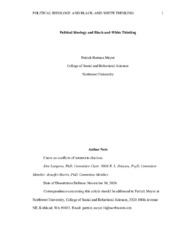| dc.contributor.advisor | Lampson, Kim | en |
| dc.contributor.author | Meyer, Patrick Herman | en |
| dc.date.accessioned | 2021-11-09T22:54:05Z | |
| dc.date.available | 2021-11-09T22:54:05Z | |
| dc.date.issued | 2020-11-30 | en |
| dc.identifier.uri | archives.northwestu.edu/handle/nu/57386 | en |
| dc.description.abstract | The political ideology of the American people has become increasingly polarized over the last decade; this trend corresponds with increasingly negative views of people with different values. Black-and-white thinking is a propensity to think of things in extremes--thinking something as fully positive or negative and not recognizing almost everything has elements of both. This study explored the history and current state of political ideology in the United States and black-and-white thinking. The aim of the study was to see if political views were related to thinking styles, specifically if an individual's level of black-and-white thinking could predict their political ideology. Online surveys were completed by 183 adults from the United States. Political ideology was conceptualized as a scale with very liberal on one side and very conservative on the other, along with concepts of social conservatism and economic conservatism. Black-and-white was measured using a scale measuring overall dichotomous thinking with subscales of dichotomous belief, preference for dichotomy, and profit-and-loss thinking. Findings suggest the more conservative someone is, the more likely they were to have higher levels of black-and-white thinking. More liberal individuals had lower levels of black-and-white thinking. Black-and-white thinking could predict conservatism, with it being a stronger predictor of social conservatism than it was for economic conservatism. The implications of this study are that thinking styles and political ideologies are interconnected, and understanding these connections can ideally improve productive conversations in and outside of the therapy office. | en |
| dc.format.extent | 66 pages | en |
| dc.format.medium | PDF | en |
| dc.language.iso | en | en |
| dc.publisher | Northwest University | en |
| dc.rights | This original work is protected by copyright. Copyright is retained by the author(s). Works may be viewed, downloaded, or printed, but not reproduced or distributed without author(s) permission. | en |
| dc.rights.uri | http://archives.northwestu.edu/page/copyright | en |
| dc.subject | Ideology�Political aspects | en |
| dc.subject | United States | en |
| dc.subject | Conservatism | en |
| dc.subject | Liberalism | en |
| dc.subject | Conservatism�Social aspects | en |
| dc.subject | Conservatism�Economic aspects | en |
| dc.title | Political Ideology and Black-and-White Thinking | en |
| thesis.degree.name | Doctor of Psychology in Counseling Psychology | en |
| thesis.degree.level | Doctoral | en |
| thesis.degree.grantor | Northwest University | en |
| thesis.degree.discipline | College of Social and Behavioral Sciences | en |


 Maintained by the Northwest University Library
Maintained by the Northwest University Library